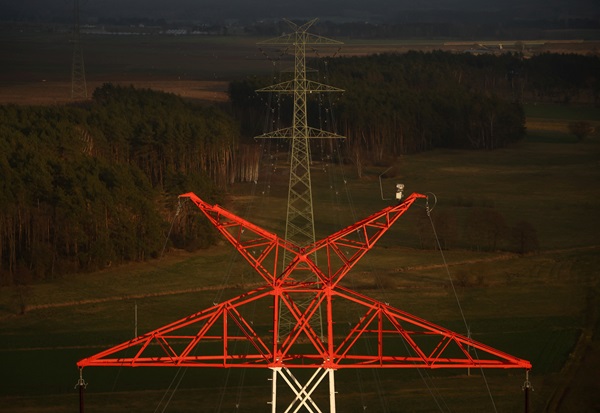 Polish transmission system operator PSE (Polskie Sieci Energetyczne) power lines are seen near Lomza, Poland, on 6 February 2025.;
Credit: REUTERS/Kacper Pempel
Polish transmission system operator PSE (Polskie Sieci Energetyczne) power lines are seen near Lomza, Poland, on 6 February 2025.;
Credit: REUTERS/Kacper Pempel
REZEKNE, Latvia (Reuters) - The three Baltic states disconnected their electricity systems from Russia's power grid on Saturday 8 February 2025, the region's operators said, part of a plan designed to integrate the countries more closely with the European Union and boost security.
Estonia, Latvia and Lithuania disconnected from the IPS/UPS joint network and, subject to last-minute tests, they will synchronise with the EU's grid at 13:00 CET on Sunday after operating on their own in the meantime.
"We've reached the goal we for strived for, for so long. We are now in control," Lithuanian Energy Minister Zygimantas Vaiciunas told a press conference.
Plans for the Baltics to decouple from the grid of their former Soviet imperial overlord, debated for decades, gained momentum following Moscow's annexation of Crimea in 2014.
The grid was the final remaining link to Russia for the three countries, which re-emerged as independent nations in the early 1990s at the fall of the Soviet Union, and joined the European Union and NATO in 2004.
The three staunch supporters of Kyiv stopped purchases of power from Russia following Moscow's invasion of Ukraine in 2022, but have relied on the Russian grid to control frequencies and stabilise networks to avoid outages.
"By ending the energy dependence of the Baltic states on Russia, we are leaving the aggressor without the option of using energy as a weapon against us", Estonian Foreign Minister Margus Tsahkna said.
An army truck was seen at the Rezekne power substation near the Latvia-Russia border, and officers with guns were patrolling the vicinity and in the nearby town, indicative of Baltic worries of attempted sabotage to disrupt the switch.
European Commission President Ursula von der Leyen will speak at a ceremony on Sunday to mark the switch to the EU system, her office said on Friday.
"The system is stable, the process is happening smoothly, no one is noticing that something changed," Latvian Energy Minister Kaspars Melnis told Reuters after the decoupling.
Maintaining a constant power supply requires a stable grid frequency, which can more easily be obtained over time in a large synchronised area such as Russia or continental Europe, compared to what the Baltics can do on their own, analysts say.
Lithuania's energy ministry told Reuters it has drawn up contingency plans whereby some heavy energy users, such as factories, could be temporarily disconnected from the grid in the event of power shortages, to maintain essential supplies.
For Russia, the decoupling means its Kaliningrad exclave, located between Lithuania, Poland and the Baltic Sea, is cut off from Russia's main grid, leaving it to maintain its power system alone.
The Baltic countries spent nearly €1.6 billion since 2018 to upgrade grids to prepare, while Moscow has spent 100 billion roubles ($1 billion), including on the building of several gas-fired power plants in Kaliningrad.








